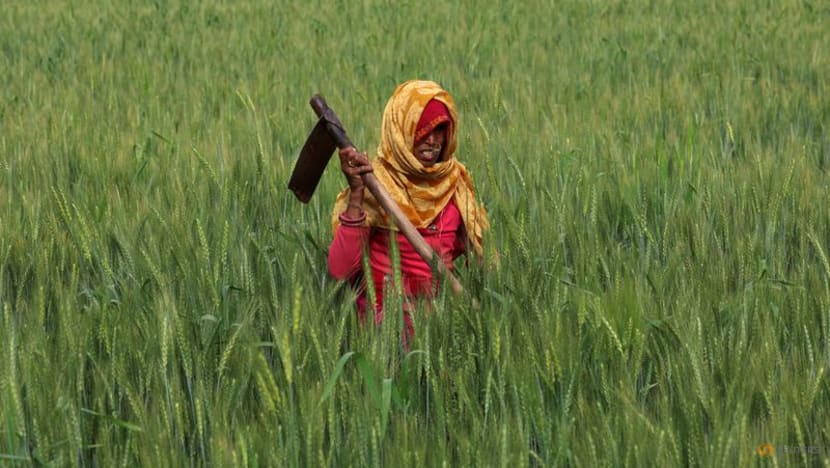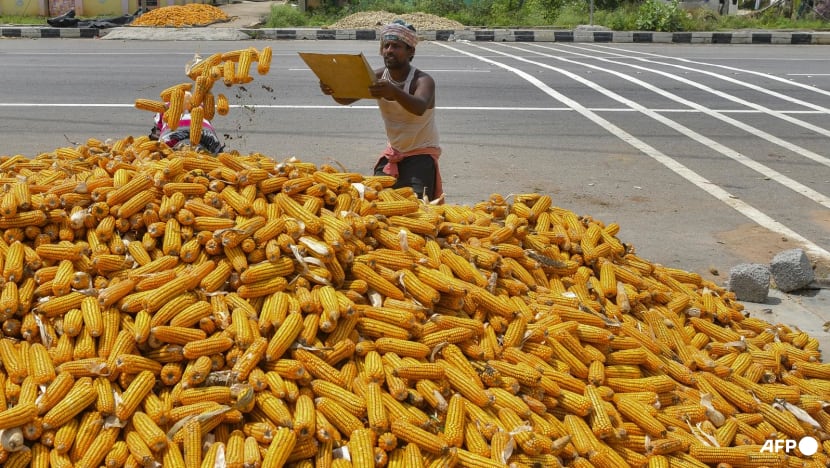Why has India vowed to protect its farmers in the face of tariff threats?

A farmer works in a wheat field near Jaipur, India, on Feb 24, 2023. (File photo: Reuters/Anushree Fadnavis)
MUMBAI: United States President Donald Trump on Thursday (Jul 31) slapped a 25 per cent tariff on Indian goods after prolonged talks that got bogged down over access to India's labour-intensive agricultural sector, which New Delhi has pledged to protect.
WHY IS INDIA OPPOSING THE PRODUCTS THE US IS LOBBYING FOR?
The US is pressing India to open its markets to a wide range of American products, including dairy, poultry, corn, soybeans, rice, wheat, ethanol, fruits and nuts.
While India is willing to provide greater access for US dry fruits and apples, it is holding back on corn, soybeans, wheat and dairy products.
A key reason for this resistance is that most US corn and soybeans are genetically modified (GM), and India does not permit the import of GM food crops.
GM crops are widely perceived in India as harmful to human health and the environment, and several groups affiliated with Prime Minister Narendra Modi's ruling Bharatiya Janata Party (BJP) are opposing their introduction.
The commercial cultivation of a high-yielding GM mustard variety that India developed itself is currently not allowed due to an ongoing legal battle.
Like GM crops, dairy is also a highly sensitive issue, as it provides a livelihood for millions of farmers, including many who are landless or smallholders. The dairy industry helps sustain farmers even during erratic monsoon seasons, which can cause significant fluctuations in crop production.
In India, where a large proportion of the population is vegetarian, food choices are strongly influenced by cultural and dietary preferences. Indian consumers are particularly concerned that cattle in the US are often fed animal by-products - a practice that conflicts with Indian food habits.
WHY ARE AGRICULTURAL IMPORTS POLITICALLY CHARGED?
India is self-sufficient in most farm goods, with the exception of vegetable oils. After liberalising cooking oil imports over three decades ago, the country now has to import nearly two-thirds of its supply to meet demand. India does not want to repeat this mistake with other basic foods, which account for nearly half of its consumer price index.
Though agriculture makes up just 16 per cent of India's nearly US$3.9 trillion economy, it is the lifeblood for nearly half the country's 1.4 billion people. Four years ago, this powerful voting bloc forced Modi's government into a rare retreat on a set of controversial farm laws.
Some in power fear a flood of cheaper US imports would bring down local prices and hand opposition parties an opportunity to sharpen their attack on the government. New Delhi is also worried that a trade deal with the US could force it to open its agricultural sector to other countries.

HOW DOES FARMING IN INDIA AND THE US DIFFER?
The vast disparity in the scale of farming makes it difficult for Indian farmers to compete with their US counterparts.
The average Indian farm is 1.08ha, compared to 187ha in the US. For dairy farmers, the difference is even more dramatic - a small herd of two or three animals versus hundreds or more in the US
Many Indian farmers also rely on traditional, unmechanised techniques, while American agriculture has developed into a highly efficient, tech-driven industry.
WHY IS INDIA HESITANT TO USE US ETHANOL IN ITS BIOFUEL PROGRAMME?
One of India's key goals with its Ethanol Blended Petrol (EBP) programme is to reduce energy imports and support domestic farmers by using sugarcane and corn for biofuel production.
Indian companies have invested heavily in new distilleries, and farmers have expanded corn cultivation to meet the rising demand. India recently achieved its ambitious target of a 20 per cent ethanol blend in petrol.
With state assembly elections approaching in Bihar, a major corn-producing state in the east, allowing US ethanol imports would lower local corn prices.
This would probably anger farmers and turn them against the BJP ahead of the election, and also undermine the growing distillery sector.















